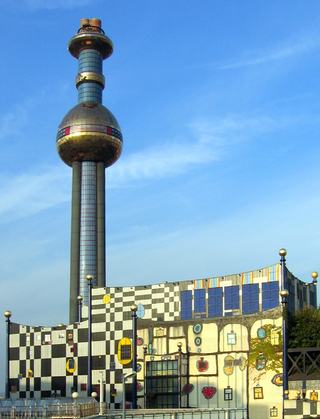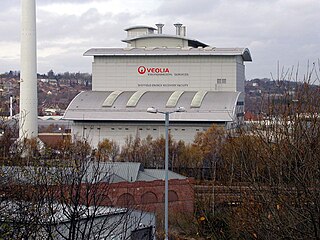
Recycling is the process of converting waste materials into new materials and objects. This concept often includes the recovery of energy from waste materials. The recyclability of a material depends on its ability to reacquire the properties it had in its original state. It is an alternative to "conventional" waste disposal that can save material and help lower greenhouse gas emissions. It can also prevent the waste of potentially useful materials and reduce the consumption of fresh raw materials, reducing energy use, air pollution and water pollution.

Incineration is a waste treatment process that involves the combustion of substances contained in waste materials. Industrial plants for waste incineration are commonly referred to as waste-to-energy facilities. Incineration and other high-temperature waste treatment systems are described as "thermal treatment". Incineration of waste materials converts the waste into ash, flue gas and heat. The ash is mostly formed by the inorganic constituents of the waste and may take the form of solid lumps or particulates carried by the flue gas. The flue gases must be cleaned of gaseous and particulate pollutants before they are dispersed into the atmosphere. In some cases, the heat that is generated by incineration can be used to generate electric power.

A zero-emission vehicle (ZEV) is a vehicle that does not emit exhaust gas or other pollutants from the onboard source of power. The California definition also adds that this includes under any and all possible operational modes and conditions. This is because under cold-start conditions for example, internal combustion engines tend to produce the maximum amount of pollutants. In a number of countries and states, transport is cited as the main source of greenhouse gases (GHG) and other pollutants. The desire to reduce this is thus politically strong.

Waste-to-energy (WtE) or energy-from-waste (EfW) refers to a series of processes designed to convert waste materials into usable forms of energy, typically electricity or heat. As a form of energy recovery, WtE plays a crucial role in both waste management and sustainable energy production by reducing the volume of waste in landfills and providing an alternative energy source.

Cory is a recycling and waste management company based in London. Originally founded as William Cory & Son in 1896, the company has operated vessels on the River Thames for more than 125 years, transporting a range of commodities and materials including coal, oil, aggregates and waste. Ships from Cory's fleet supported Britain's war efforts in both world wars, with 30 ships being lost during the conflicts. From the 1980s onwards, the business has become increasingly focused on waste management.

The Sheffield Energy Recovery Facility, also known as the Energy from Waste Plant, is a modern incinerator which treats Sheffield's household waste. It is notable as it not only provides electricity from the combustion of waste but also supplies heat to a local district heating scheme, making it one of the most advanced, energy efficient incineration plants in the UK. In 2004, the district heating network prevented 15,108 tonnes of CO2 from being released from buildings across the city, compared to energy derived from fossil fuels. The incinerator is a 'static asset' owned by Sheffield City Council and operated by Veolia Environmental Services under a 35 year integrated waste management contract (IWMC)/PFI contract.

South East London Combined Heat and Power, better known as SELCHP, is a major energy from waste incineration plant in Bermondsey, London. It was designed to generate both heat and electricity. The plant can generate up to 35 MegaWatts of power using a steam turbine in electricity only mode. It can incinerate up to 420,000 tonnes per year of municipal solid waste.

Veolia Environmental Services, formerly Onyx Environnement, is a division of Veolia Environnement. It employs nearly 78,000 staff, has operations in 35 countries around the world, and generated revenues of nearly €9.02 billion in 2009.

Modec was an electric vehicle manufacturer in Coventry, in the United Kingdom, specialising in Commercial vehicles in the N2 category. It unveiled its first model in April 2006 and announced its intention to commence series production in March 2007, with the first production vehicles destined for Tesco. Following a long-term decline in sales, it entered administration in March 2011, with all remaining assets and intellectual property sold to Navistar International.

Tyseley Energy Recovery Facility is a waste incineration plant in Birmingham, UK. It is run by Veolia for Birmingham City Council.

In 2015, 43.5% of the United Kingdom's municipal waste was recycled, composted or broken down by anaerobic digestion. The majority of recycling undertaken in the United Kingdom is done by statutory authorities, although commercial and industrial waste is chiefly processed by private companies. Local Authorities are responsible for the collection of municipal waste and operate contracts which are usually kerbside collection schemes. The Household Waste Recycling Act 2003 required local authorities in England to provide every household with a separate collection of at least two types of recyclable materials by 2010. Recycling policy is devolved to the administrations of Scotland, Northern Ireland and Wales who set their own targets, but all statistics are reported to Eurostat.

Yarra Valley Water is the largest of three Victorian Government owned retail water corporations that provides drinking water,sewerage, trade waste, recycled water, and water-saving services to over two million people and over 61,000 businesses in the northern and eastern suburbs of Melbourne, or around 30% of Victoria's population. The water distributed by Yarra Valley Water is supplied by Melbourne Water, as is the infrastructure. Oversight is provided by the Department of Energy, Environment and Climate Action.

Sims Limited (formerly Sims Metal Management Limited) is a global environmental services conglomerate, operating through a number of divisions, with a focus on: (a) Ferrous and Non-ferrous metal recycling, (b) enterprise data destruction and cloud asset management (c) post-consumer electronic goods recycling and reuse, (d) municipal waste recycling, (e) gas to energy, and (f) waste to energy. Founded in 1917, its primary operations are located in the United States, Australia and the UK.

Teesside Energy from Waste plant is a municipal waste incinerator and waste-to-energy power station, which provides 29.2 megawatts (MW) of electricity for the National Grid by burning 390,000 tonnes of household and commercial waste a year. It is located on the River Tees at Haverton Hill, east of Billingham in North East England. Developed and built by NEM, a subsidiary of Northumbrian Water, the initial plant replaced the Portrack Incinerator and opened in 1998. Subsequently, the facility became part of SITA, now Suez.

In 2021, net greenhouse gas (GHG) emissions in the United Kingdom (UK) were 427 million tonnes (Mt) carbon dioxide equivalent, 80% of which was carbon dioxide itself. Emissions increased by 5% in 2021 with the easing of COVID-19 restrictions, primarily due to the extra road transport. The UK has over time emitted about 3% of the world total human caused CO2, with a current rate under 1%, although the population is less than 1%.

Wong Kam-sing, GBS, JP, is a Hong Kong architect and the former Secretary for the Environment, Wong had held a number of public service positions before joining the Government, including the first Chairman of the Environment and Sustainable Development Committee of the Hong Kong Institute of Architects, the Chairman of the Professional Green Building Council and the Vice Chairman of the Hong Kong Green Building Council. He has contributed to the promotion and research of the standards and guidelines for sustainable built environment applicable to the high-density urban environment of Hong Kong.

Chinook Sciences is a US and UK based technology company that specializes in waste to energy and metal recovery.

Food waste recycling is a process to convert food waste into useful materials and products for achieving sustainability of the environment. Food waste is defined as all parts of food, inedible and edible, created before, during, and after food processing, production, and consumption. Greenhouse gases, especially methane can be reduced by food waste recycling. Food waste recycling can also alleviate the saturation of landfill sites in Hong Kong.

Allerton waste recovery park is a waste recovery and incineration site located on a former quarry at Allerton Mauleverer, near Knaresborough, England. It is operated by AmeyCespa on behalf of North Yorkshire County Council and City of York Council, the site is capable of handling 320,000 tonnes of household waste per year.

Gloucestershire Energy from Waste facility, also known as the Javelin Park Incinerator is an incinerator and energy-from-waste power station which produces 14.5MW of energy for the National Grid, by burning up to 190,000 tonnes of residual waste each year. The site is located adjacent to the M5 motorway, near junction 12 and to the south of Gloucester.


















